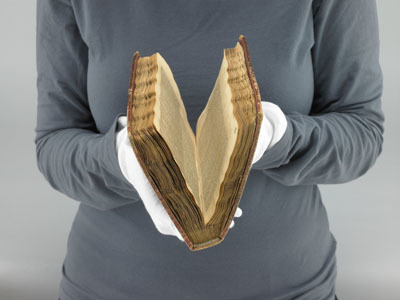Did Jefferson really edit out the miracles from his Bible?

Once in a while, the myth that Thomas Jefferson edited down the Bible in order to remove the miraculous, resurfaces. He supposedly did this because he was essentially an unbeliever who thought that religion had no place in the public square.
A couple of years ago, I teamed up with a pastor from Jefferson’s home town of Charlottesville, Virginia, Dr. Mark Beliles, to write a book on the faith of our third president. The book is Doubting Thomas: The Religious Life and Legacy of Thomas Jefferson (MorganJames, 2014).
There are two main points to our book.
1) Whatever serious doubts he may have privately held later in life, Jefferson was not a lifelong skeptic. In fact, when he was most productive and helpful to the country, he was from all outward appearances a practicing Christian. This would include when he wrote the Declaration of Independence and the Virginia Statute of Religious Freedom (1777, passed in 1786), which says that because of the example of the “holy author of our religion” (Jesus), people should be free to believe or disbelieve.
2) Regardless of whatever theological unorthodoxy he held (later in life), he did not believe in the separation of God and government—which is the way the ACLU and other secularists try to portray him.
For example, on a regular basis, when he was president, Jefferson attended the Christian worship services held at the U.S. Capitol building—services he approved of, which continued long after he was president.
As president, Jefferson took time one night in 1804 to cull through the sayings of Jesus as found in the four Gospels. Why did he do this?
The title he himself put on this unpublished work gives us a clue: The Philosophy of Jesus of Nazareth Extracted From the Account of His Life and Doctrines as Given by Matthew, Mark, Luke & John; Being an Abridgement of the New Testament for the Use of the Indians Unembarrassed with Matters of Fact or Faith Beyond the Level of Their Comprehensions.
This abridgement, clearly intended for the Indians, was not a biography of Jesus, only His “philosophy” as the title states. As such it left out most material found in the Gospels that did not fit the goal of compiling a “philosophy,” but there is no evidence of a motive to delete all of the miracles or evidences of Jesus’ divinity.
As our third president, Jefferson had made the largest land addition in American history with the Louisiana Purchase. Suddenly, hundreds of thousands of Native-Americans, many of whom had never heard about Jesus, were added to American territory. He wanted them to benefit from the moral teachings of Jesus Christ.
Jefferson believed: “Of all the systems of morality, ancient or modern, which have come under my observation, none appear to me so pure as that of Jesus.” (Letter to William Canby, September 18, 1813).
Much thought in the Christian world has gone toward important theological matters like the nature of Christ (as fully divine and fully human), and the nature of the Godhead---Three Persons, One God (the Trinity). Jefferson felt (perhaps condescendingly) that such matters of theology and philosophy were beyond the Indians. As a result, he wanted to simplify Christ’s teachings. He may have been misguided, but there’s no evidence that his motive was secularization or anti-supernaturalism, as many today claim.
Jefferson wanted the Native-Americas benefit from Jesus’ moral teachings--things we take for granted, like: the golden rule (i.e., do unto others as you would have them do unto you, Matthew 7:12) or the command to love one another, as Christ loves us (John 13:33).
There is no evidence I am aware of that Jefferson ever published “The Philosophy of Jesus.” There is evidence that around 1819, he created a second version of his private book, this time in English (the King James Version), in French, in Latin, and in Greek (the language of the Gospels). It was only published long after his death.
Apparently, he used this compilation of the teachings of Jesus for his own personal edification.
Here are some miracles that remain in the so-called “Jefferson Bible”:
•Jesus sent His disciples to “heal the sick,” “cleanse the lepers,” “raise the dead,” “cast out devils” (Matthew 10:8).
•He healed a man on the Sabbath (Luke 14:1-6);
•He raised Jairus’ daughter from the dead (Matthew 9:18-25);
•He healed the bleeding woman (Matthew 9:20-22);
•Jesus healed two blind men (Matthew 9:27-31).
Jefferson’s approach to the Bible, to strip away some of its rich doctrine in Christology or in the beauty of the Godhead, is not commendable or worthy of imitation. But contrary to what some atheists say today, Jefferson was not on a crusade to edit the miracles out of the Bible.




























